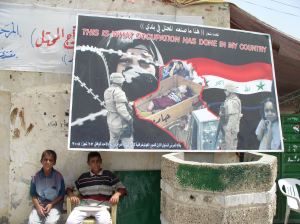
By Peggy Faw Gish
For the past eleven years, Iraq has been dealing with the aftermath of war and devastation of their society. I have personally witnessed and walked with the Iraqi people as the bombs began to fall on Baghdad in the early morning hours of March 19, 2003 and in the following years as they have struggled to rebuild and resist the continued violence. Understanding their ordeal compels us to do what we can to prevent such tragedies being thrust upon other societies by our nation.
In my years of living among and working, as part of a peace group, with the Iraqi people, I’ve had the privilege of seeing their strength and courage, their beauty of culture and spirit. Many Iraqis say “no” to revenge and violence that continues to tear apart their society and then work for strong, nonviolent alternatives. I share about these Iraqis, and other fantastic experiences I’ve had, in my book, Walking Through Fire: Iraqis Struggle for Justice and Reconciliation, (Cascade books, 2013)..
In this short article, however, I simply want to summarize some of the more objective, factual results of the war, some of which comes from international agencies and some from my observation and gathering information on the ground. I do this as a reminder and to give us pause, when the next cry for and justification for war comes.
International agencies have estimated Iraqi deaths to be (Iraq Body Count, March 2003-2013: 174,000), (Lancet survey, March 2003-June 2006: 654,965) – (Opinion Research Business (ORB) survey, March 2003-June 2006: 1,033,000 Iraqi civilians [questioned by many]. Whatever the figure, all the deaths must be mourned.
An estimated 5 million Iraqis have fled their homes to other countries or as displaced persons in their own country because of the dangers and hardships. The massive destruction of infrastructure during the invasion, the gutting of Iraqi economy by U.S. imposed economic laws and deregulation, and increase of general violence and insecurity, all played a part in devastating the society.
Eleven years later, most of Iraq (other than the semi-autonomous northern Kurdish region) remains broken from the invasion and occupation and it’s hard to find anyone who will say it improved their situation or solved the problems they faced. Here is a glimpse into current conditions:
Iraqis live in daily fear of street violence, explosions, kidnappings, ethnic violence, extra-judicial arrests and imprisonment. Civil society is still weakened. The trust and cohesion necessary for a peaceful society has been diminished. There is widespread anger and despair about the conditions of their lives. In the Kurdish-controlled region in the north, people live with less fear of daily violence, but with most of the same economic deprivation, the general lack of human rights as the rest of Iraq. There are still the following conditions:
● Much of the infrastructure remains un-repaired, so the majority of Iraqis live with contaminated water, limited electricity, and inadequate medical care.
● Continued economic crisis, with higher prices for food and fuel, but little increase in wages. Oil revenues shared with multinational corporations given generous contracts to develop oil, as well as massive corruption in government and its agencies, siphon away much of the money earmarked for rebuilding infrastructure and caring for human needs.
● Their country is polluted with radioactive depleted uranium from U.S. weaponry used in the 1991 and 2003 wars. This continues to cause increased cancers, leukemia, and birth defects—the current highest rate being in the city of Fallujah.
● In Iraqi prisons, many innocent detainees are forced, through torture, to confess to acts of violence they did not commit. Iraqis often feel terrorized by Iraqi Special Forces.Many Iraqis say that the ways of Saddam continue.
● Women are subjected to violence and loss of personal rights and freedoms. Children grow up seeing violence and killing as the norm. Many young adults have little hope for their future.
● There are general elections and a ratified constitution, but the government is plagued with power struggles. It uses dictatorial methods of governance to maintain its dominance, and excessive anti-terrorism methods to combat the influx of foreign Al-Qaeda-like fighters into the country and spread of terrorist cells. Kurds in Kirkuk and other northern disputed areas are afraid of more genocide against them as well as civil war between Arabs and Kurds.
● In the Kurdish north, there is currently a cease fire between Turkey and the PKK (Kurdish rebel fighters in the border areas), and less shelling into Kurdish border villages from Iran, giving hope for a diplomatic resolve of the three decade conflict.
Though Iraqis have suffered from brutal policies of Saddam’s regime, and US and UK interventionist policies before 2003, occupying forces have exacerbated ethnic conflicts and oppressive political forces in their country, that will continue to cause suffering and hardship for generations. Iraqis and people around the world continue to ask, “Why?”, since the alleged weapons of mass destruction development there did not exist. They see the motivating factors or the war being: U.S. drive for control of and financial gain from Iraqi oil; privatization and exploitation of Iraq’s economy; and maintaining bases and military control in that part of the world, coupled with a crass disregard for the wellbeing and rights of the Iraqi people.
I hope you will also say, about such a war: “Never Again!”
(link to flier about Peggy’s book, Walking Through Fire: Iraqis’ Struggle for Justice and Reconciliation): https://plottingpeace.files.wordpress.com/2013/11/gish_28521e.pdf
